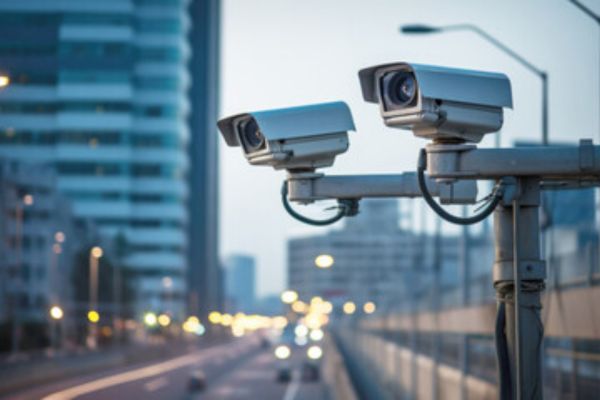
As the festive season approaches, many homeowners and business owners consider implementing enhanced security measures to safeguard their premises. It is important to remember that ensuring the safety of our homes and loved ones becomes paramount. Among the plethora of options available in the market today, two popular choices stand out: CCTV security cameras and surveillance cameras. While the terms are often used interchangeably, there are distinct differences between these two technologies. In this informative blog, we will delve into the major disparities between CCTV Security Cameras and surveillance cameras, offering insights to help you make an informed decision for your security needs this Christmas.
Understanding CCTV Security Cameras and Surveillance Cameras
Closed-Circuit Television (CCTV) security cameras have been a staple in security systems for decades. Designed primarily for surveillance purposes, CCTV cameras provide real-time monitoring and recording capabilities. They utilise wired connections to transmit the footage to a designated monitoring station or digital video recorder (DVR). Surveillance cameras, on the other hand, encompass a broad category of devices, including both wired and wireless options. These Security Cameras offer enhanced versatility and are typically more straightforward to install and configure, making them an ideal choice for residential purposes.
Purpose and Function
- CCTV Security Cameras: CCTV (Closed-Circuit Television) Security Cameras are primarily designed to monitor specific areas in real time. These cameras are often employed for active surveillance in places like banks, shopping malls, or public areas. CCTV systems allow security personnel to actively monitor live footage and respond promptly to any potential threats or breaches.
- Surveillance Cameras: Surveillance cameras, on the other hand, are more passive in nature. These Surveillance Cameras are employed to record and store footage for later review or evidence collection. Surveillance systems are commonly used in residential areas, small businesses, or private properties. They provide a sense of security and act as a deterrent to potential criminals.
Installation and Infrastructure
- CCTV Security Cameras: Installing a CCTV security camera system typically requires professional expertise. These systems involve the setup of multiple cameras, a central monitoring station, and the integration of various components to ensure a seamless surveillance network. The complexity of these systems often necessitates the guidance of experts for optimal performance.
- Surveillance Cameras: Surveillance cameras, on the other hand, are relatively easier to install and set up. They usually come as standalone devices or part of a DIY kit. With wireless options available, homeowners can easily mount surveillance cameras in desired locations without the need for extensive infrastructure. This makes them a convenient choice for personal and small-scale security needs.
Accessibility and Monitoring
- CCTV Security Cameras: The primary advantage of CCTV Security Cameras lies in their ability to provide real-time monitoring. With a central monitoring station and dedicated personnel, these systems ensure continuous surveillance and prompt response to any security breaches. However, accessing live footage from CCTV cameras may be restricted to authorised personnel only.
- Surveillance Cameras: Surveillance cameras offer increased accessibility to footage. Most contemporary surveillance systems incorporate mobile apps or web interfaces, allowing homeowners to monitor their properties from anywhere remotely. This feature enables users to check in on their properties, receive notifications, and even review footage remotely using smartphones or other internet-enabled devices.
Storage and Data Management
- CCTV Security Cameras: CCTV security cameras generally employ on-site storage solutions, such as a Digital Video Recorder (DVR) or Network Video Recorder (NVR). These devices ensure continuous recording and storage of footage. However, the storage capacity of these systems is limited and may require periodic backup or maintenance to prevent the loss of crucial data.
- Surveillance Cameras: Surveillance Cameras utilise various storage options, including cloud-based services or local storage devices, like an SD card or external hard drive. Cloud storage offers the advantage of remote access and expanded storage capacity, while local storage allows for more control over data management. Homeowners can choose the option that best suits their needs and budget.
This Christmas, investing in a reliable security solution is crucial for safeguarding your loved ones and property. In the realm of security systems, understanding the distinctions between CCTV security cameras and surveillance cameras becomes crucial when making an informed decision. Before investing in a security solution this Christmas, carefully evaluate your specific needs and budget. Whether you opt for CCTV Security Cameras for active monitoring or surveillance cameras for passive recording, both options contribute significantly to enhancing your security and peace of mind.
By considering the different factors, you can make a well-informed choice and ensure your property’s safety during the holiday season and beyond. embrace technology this holiday season and cherish the joy of celebrations, knowing your home is protected by advanced security measures. Remember, whether you opt for CCTV security cameras or surveillance cameras, any investment in enhanced security measures from 1300 Cameras is a step towards peace of mind and protection for you and your loved ones. Stay safe and secure this Christmas!


